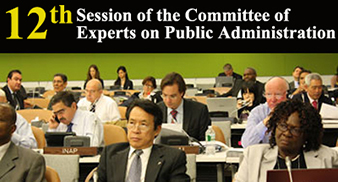The Committee of Experts on Public Administration held its twelfth session at the United Nations in New York from 15 to 19 April 2013. Its theme was “Role of responsive and accountable public governance in achieving MDGs and post-2015 developmental agenda”.
Report
Arabic | Chinese | English | French | Russian | Spanish
Subtopics | Major recommendations/conclusions |
Making public governance work for the post-2015 developmental agenda | The key issues that emerged during the discussion were the importance of: (a) access to information; (b) innovation in government so as not to become trapped in administrative routine; (c) combining the global and local, avoiding a “one size fits all” approach and using indicators that fit the shifting socioeconomic conditions of a country; (d) quality, relevance and local proximity of data; (e) local ownership of development objectives and some combination of horizontal and top-down engagement in objective-setting; (f) the role of the political system, including the importance of political competition and inclusion for longer-term development objectives; and (g) searching for good local practices and learning to scale them up. Recommendations included promoting: the professionalization of public administration; access to information; the availability of adequate data; better use of public-private partnerships with cooperative approaches; institution-building for preventing and combating corruption; innovative approaches with proper considerations to the local context and local solutions; effective relationships between the government and citizens; the localization of citizen engagement initiatives and local capacity development to implement the Millennium Development Goals and sustainable development goals; the empowerment of citizens to get more engaged; and the adaptation and broad use of modern means of communications. |
Accountability of stakeholders in public governance for development | A critical post-2015 role for States Members of the United Nations is to ensure clarity in the respective roles, responsibilities and resources of the main stakeholders, which include not only government at the national and local levels but also civil society, the private sector, donors and other major actors. |
Creating an enabling environment for the post-2015 development agenda | In the light of a period of transformational change requiring collaboration across all sectors, Member States and the Department of Economic and Social Affairs are encouraged to promote collaborative governance at all levels to support a three-pronged approach, comprising: (a) training and capacity-building; (b) the development of appropriate case studies and guidance on best practices; and (c) a clearing house or similar mechanism for the benefit of Member States, including best practices that might be used in comparable country contexts. Member States are encouraged to reinforce the importance of human capital development in the achievement of the post-2015 agenda, including capacities related to addressing country-specific challenges and the identification of opportunities such as vocational training. In addition, Member States could encourage Governments to strengthen existing institutions with a view to arresting the detrimental impacts of “brain drain”. Member States are encouraged to explore how to provide capacity-building mechanisms for major stakeholders on public administration and good governance, the latter being defined, where appropriate, in a country-specific context. Member States should include in their post-2015 development agendas the consideration of the role and necessary coordination of donor agencies so as to align as far as possible both the global agenda and the policy priorities of national Governments. The Department of Economic and Social Affairs should continue with its use of case studies and model codes of conduct as a means of providing guidance to countries on how to achieve solutions while ensuring that they take the specific circumstances of member countries into account — such as the political context and level of development — and tailor any implementation guidance to country needs. |
 Welcome to the United Nations
Welcome to the United Nations
